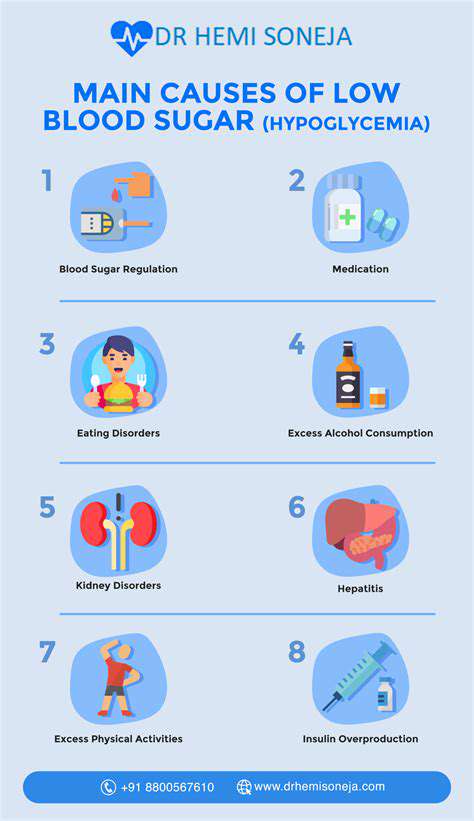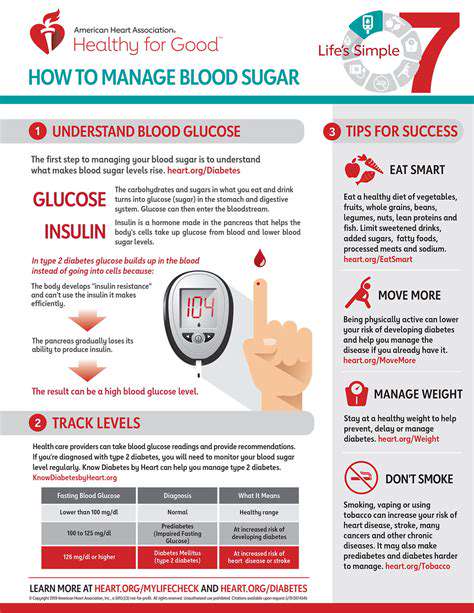Essential Insights into Managing Low Blood Sugar Levels
Causes of Low Blood Sugar

Understanding Hypoglycemia
Hypoglycemia occurs when blood sugar levels drop below normal ranges, affecting bodily functions. This condition is particularly concerning for individuals with diabetes. Early recognition of symptoms is essential for effective management.
Common symptoms include dizziness, confusion, and palpitations, which can escalate if not addressed promptly. Maintaining a steady intake of carbohydrates can help stabilize blood sugar levels. It's crucial to listen to your body and respond to its signals.
In some cases, hypoglycemia can happen without warnings, making it vital to monitor your blood sugar levels regularly. Being aware of your body’s cues can help you prevent serious complications associated with low blood sugar.
Dietary Factors Leading to Low Blood Sugar
The type and timing of food intake play significant roles in blood glucose management. Skipping meals or not eating enough carbohydrates can trigger low blood sugar episodes. It's important to plan balanced meals and snacks throughout the day.
Foods high in sugar may cause a rapid spike in glucose followed by a swift drop, contributing to hypoglycemia. Incorporating complex carbohydrates, proteins, and healthy fats can create a more stable energy release. The goal is to maintain a sustained level of blood glucose over time.
Additionally, excessive alcohol consumption can interfere with your body’s ability to regulate blood sugar. Monitoring your diet and understanding how different foods impact your glucose levels can mitigate the risk of hypoglycemia.
Impact of Medications on Blood Sugar Levels
Certain medications, especially those used to treat diabetes, can lead to low blood sugar as a side effect. Insulin and sulfonylureas are commonly associated with hypoglycemia. It's essential to work closely with your healthcare provider to find the right medication dosages.
Some non-diabetes medications may also affect blood sugar levels, emphasizing the importance of reviewing all prescriptions with a physician. Understanding how each medication interacts with your body can prevent unexpected drops in glucose.
Regular monitoring of blood sugar levels while on medications can provide insights into how your body responds to treatment. This information can help you adjust your lifestyle and medication if necessary to avoid hypoglycemic episodes.
Physical Activity and Its Effects
Exercise is beneficial for overall health, but it can also lead to low blood sugar, especially in those taking insulin or diabetes medications. A rigorous workout can deplete the body's glucose stores rapidly. Planning your exercise routine and adjusting food intake can help manage these effects.
It's advisable to monitor blood sugar levels before, during, and after physical activity to prevent hypoglycemia. If you notice changes, consider adjusting your carbohydrate intake accordingly. Staying hydrated and aware of your body’s cues is critical during exercise.
Incorporating small snacks before intense workouts may help maintain stable blood sugar levels. Recognizing how different types of exercise affect your body can lead to better management strategies.
Stress and Hormonal Influences
Stress can have a profound impact on blood glucose levels, often causing fluctuations that lead to hypoglycemia. When the body is stressed, it releases hormones that can affect insulin and glucose regulation. Understanding your stress triggers can help you manage your blood sugar effectively.
Moreover, hormonal changes during different life stages, such as menstruation or menopause, can also influence blood sugar levels. It’s essential to recognize these patterns and prepare accordingly. Keeping a journal can assist in identifying correlations between stress, hormones, and blood sugar levels.
Finding effective stress management techniques, such as meditation or yoga, can contribute to more stable blood sugar levels. Addressing the root causes of stress is crucial for maintaining overall health and well-being.
Symptoms of Low Blood Sugar
Common Physical Symptoms
Individuals experiencing low blood sugar often report common physical symptoms that can vary in intensity. These may include shakiness, sweating, and palpitations. Such physical manifestations typically arise as the body tries to counteract the decreased glucose levels, triggering a fight-or-flight response.
Other symptoms may encompass dizziness, weakness, and fatigue, which can significantly affect daily activities. Recognizing these signs early allows for quick intervention, reducing the risk of more severe complications.
Mental and Emotional Effects
Low blood sugar doesn't only impact physical health; it can also significantly influence mental and emotional wellbeing. Individuals may experience confusion, irritability, and difficulty concentrating. These cognitive effects can lead to poor decision-making and emotional outbursts, affecting both the individual and those around them.
Moreover, severe cases of hypoglycemia can result in more serious outcomes, such as loss of consciousness or seizures. Understanding these mental symptoms is crucial for prompt recognition and management of low blood sugar episodes.
Long-Term Consequences
If low blood sugar episodes are frequent and untreated, individuals may experience long-term health issues, including complications related to cardiovascular health and neurocognitive function. Chronic hypoglycemia can lead to impaired hormonal responses, making it more challenging for the body to react appropriately to future instances of low blood sugar.
Additionally, recurrent episodes may result in a condition known as hypoglycemia unawareness, where individuals do not recognize the early warning signs of low blood sugar. This can dramatically increase their risk of severe hypoglycemia, necessitating substantial lifestyle changes and more proactive management strategies.
Triggers of Low Blood Sugar Levels
Several factors can trigger low blood sugar levels, including excessive physical activity, irregular eating patterns, and the influence of certain medications, particularly insulin or oral hypoglycemic agents. Individuals with diabetes are especially susceptible, as managing their insulin requires careful monitoring of food intake and exercise.
Alcohol consumption and fasting can also significantly lower blood sugar levels. Understanding these triggers can help individuals develop strategies to avoid potential lows and maintain stable glucose levels throughout the day.
Immediate Actions When Experiencing Symptoms
When symptoms of low blood sugar present themselves, swift action is crucial. The immediate recommendation is to consume fast-acting carbohydrates, such as glucose tablets, fruit juice, or regular soda. These sources quickly raise blood sugar levels and help alleviate symptoms.
Monitoring blood sugar levels regularly is essential, especially for those at risk. Having a plan in place for managing hypoglycemia—such as carrying glucose sources—is imperative for ensuring safety and confidence in daily activities.
Managing Low Blood Sugar

Understanding Low Blood Sugar Levels
Low blood sugar, or hypoglycemia, occurs when the glucose levels in your blood drop below normal. This condition can lead to symptoms such as dizziness, confusion, and in severe cases, unconsciousness.
It is important to recognize the symptoms of low blood sugar early on to prevent more serious health issues. By monitoring your glucose levels regularly, you can take proactive measures to manage your health effectively.
Causes of Low Blood Sugar
There are various factors that can contribute to low blood sugar levels. These include certain medications, excessive alcohol consumption, and not eating enough carbohydrates throughout the day.
Additionally, individuals with diabetes need to be especially cautious as insulin and other glucose-lowering medications can significantly increase the risk of hypoglycemia. Understanding these causes is crucial for effective management.
Strategies for Managing Low Blood Sugar
To effectively manage low blood sugar, it’s essential to consume quick sources of glucose when needed. Foods like fruit juice, glucose tablets, or sugary snacks can quickly elevate blood sugar levels.
Moreover, maintaining a balanced diet and regularly scheduled meals can help prevent drops in blood sugar. Consult with a healthcare professional to create a structured meal plan tailored to your needs.
When to Seek Medical Attention
Recognizing Symptoms of Low Blood Sugar
Low blood sugar, or hypoglycemia, presents various symptoms that can vary in intensity. Common early signs include sweating, trembling, and increased heart rate. These physical responses are the body's way of signaling that it needs immediate intervention to restore glucose levels.
As hypoglycemia progresses, symptoms may worsen to include confusion, irritability, and dizziness. It's important to be aware of these symptoms, especially for individuals with diabetes who may experience them more frequently due to insulin or medication use.
If left unaddressed, severe hypoglycemia can lead to loss of consciousness, seizures, or even coma. Therefore, recognizing these warning signs is crucial for timely management and prevention of more serious complications.
Immediate Treatment Options
When symptoms of low blood sugar are recognized, it is vital to act quickly. Consuming fast-acting carbohydrates is the most effective immediate treatment. Options include glucose tablets, fruit juice, or regular soda, which can quickly elevate blood sugar levels.
For those who are unable to consume food or drink due to severe symptoms, administering a glucagon injection can be critical. Glucagon is a hormone that prompts the liver to release stored glucose into the bloodstream, rapidly correcting low blood sugar levels.
After stabilizing blood sugar levels, it is essential to plan for the next steps, which may include monitoring levels more frequently and adjusting dietary intake or medication usage accordingly to prevent future episodes.
Preventive Measures
To effectively manage low blood sugar, preventive measures should be a cornerstone of diabetes management. This includes regular monitoring of blood glucose levels, especially before and after meals, exercise, and during times of illness or stress.
Meal planning plays a significant role in preventing hypoglycemia. Incorporating a balanced diet that includes carbohydrates, proteins, and fats can help maintain stable blood glucose levels. It's advisable to carry snacks at all times, especially for those at higher risk of experiencing low blood sugar episodes.
Education on managing diabetes is also essential. Individuals should be aware of their medication, the timing of doses, and how lifestyle choices affect their blood sugar. Collaborating with healthcare providers can ensure a tailored approach to prevention strategies.
When to Seek Medical Attention
If an individual experiences frequent episodes of low blood sugar or has difficulty managing their levels despite following guidelines, it is crucial to seek professional medical advice. Regular check-ups can help identify any underlying issues or adjustments needed in their diabetes management plan.
In situations where a person becomes unresponsive, exhibits seizure-like activity, or if symptoms persist despite treatment, emergency medical services should be contacted immediately. Rapid intervention can be lifesaving in severe cases of hypoglycemia.
Moreover, educating family members or close friends about hypoglycemia and how to respond can provide an additional layer of safety for those at risk. Having a clear action plan in place can ensure that timely help is available when needed.